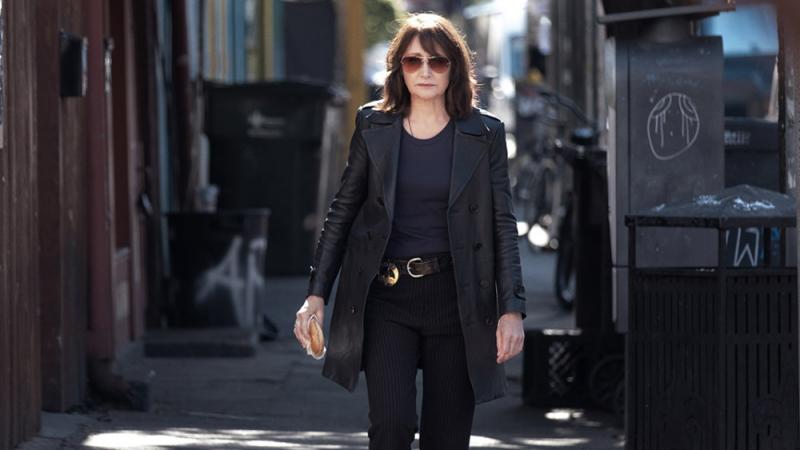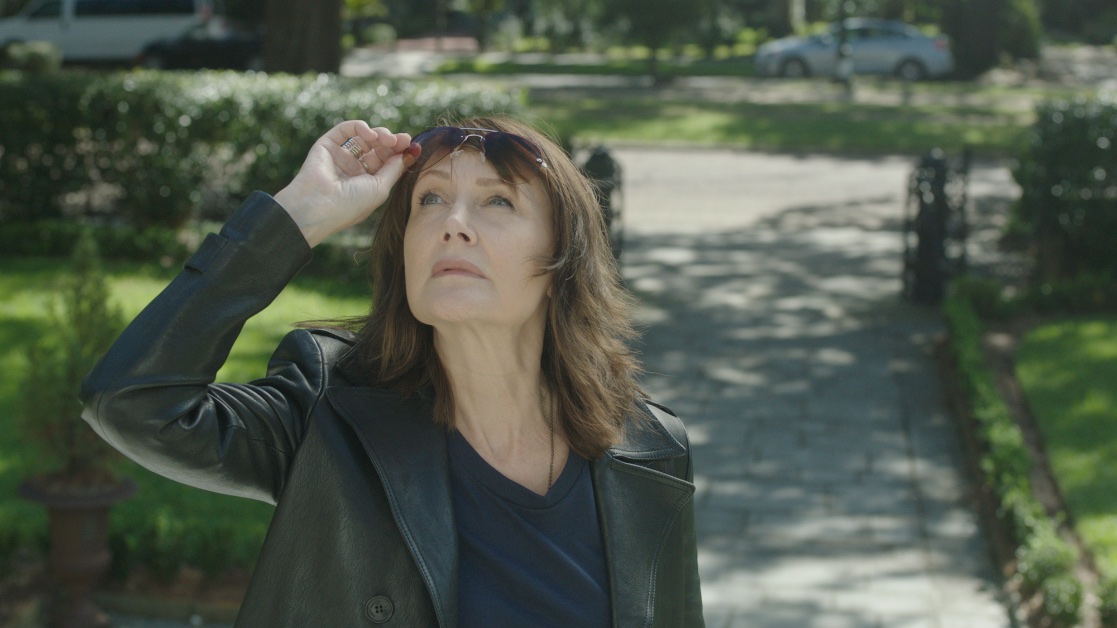Out of Blue review - noir and cosmology collide | reviews, news & interviews
Out of Blue review - noir and cosmology collide
Out of Blue review - noir and cosmology collide
Carol Morley adapts Martin Amis' detective novel into a moody, overblown enigma

At the start of Carol Morley’s noir mystery Out of Blue, detective Mike Hoolihan, bleary-eyed and slow, is carrying some burdensome weight. “This burger from last night is not sitting right,” comes the weary female investigator’s first line.
Loosely adapted from Martin Amis’ 1997 novel Night Train, Out of Blue begins after the apparent murder of astrophysicist Jennifer Rockwell (Mamie Gummer). Rockwell’s research is in black holes and in piercing the heart of the universe’s “dark matter”. She is found dead in the observatory where she works, shot in the face. A few items are left strewn around her and provide leads. Something about the objects brings up a painful, unidentifiable recollection for Hoolihan. She is a “case-closing legend” but also a recovering alcoholic, and the detritus before her spurs a moment of self-reflection. Will she be able to close this one? Will relapse ensue? From this point onwards, the plot’s two strands – finding the killer, and delving into the dark matter of Hoolihan’s self – leap off and intertwine in characteristic noir fashion. Hoolihan’s first suspect is Rockwell’s lover Duncan Reynolds (Jonathan Majors), who is also a lecturer in astrophysics. He is sensitive, a deep thinker, and the perfect mouthpiece to amplify the film’s metaphysical tone with lines like, “The only way to enter a black hole is in our minds.” Other suspects emerge. There is the neurotic Professor Ian Strammi (Toby Jones), who is a colleague of Rockwell’s. Then, echoing John Huston in Chinatown, there is Rockwell’s father, Colonel Tom Rockwell (James Caan), a sour businessman and army veteran. Morley is content to have Hoolihan stumble along without any breakthroughs, instead preferring to evoke a dreamy mood and have her ponder morbid profundities. One of Jennifer Rockwell’s observations, delivered in an interview video that Hoolihan researches, grasps a bit too desperately in this direction: “In order for us to live, a star must die.”
Hoolihan’s first suspect is Rockwell’s lover Duncan Reynolds (Jonathan Majors), who is also a lecturer in astrophysics. He is sensitive, a deep thinker, and the perfect mouthpiece to amplify the film’s metaphysical tone with lines like, “The only way to enter a black hole is in our minds.” Other suspects emerge. There is the neurotic Professor Ian Strammi (Toby Jones), who is a colleague of Rockwell’s. Then, echoing John Huston in Chinatown, there is Rockwell’s father, Colonel Tom Rockwell (James Caan), a sour businessman and army veteran. Morley is content to have Hoolihan stumble along without any breakthroughs, instead preferring to evoke a dreamy mood and have her ponder morbid profundities. One of Jennifer Rockwell’s observations, delivered in an interview video that Hoolihan researches, grasps a bit too desperately in this direction: “In order for us to live, a star must die.”
Amis’ Night Train was a wry parody of the hardboiled detective genre in which he smuggled in existential themes for dramatic embellishment. In Out of Blue, Morley eschews the parodic humour but overloads on the weighty themes. Clarkson combines the two modes of superior detective and trauma-riddled soul without flaw, but she is dragged along through a dispersed and tiresome plot. Like the dolorous heat of New Orleans, where the action takes place, the film’s tone is too overbearing. If the self-effacing whimsy of Hoolihan’s first remark had continued throughout the film, the oppressive baggage might have been bearable.
rating
Explore topics
Share this article
The future of Arts Journalism
You can stop theartsdesk.com closing!
We urgently need financing to survive. Our fundraising drive has thus far raised £49,000 but we need to reach £100,000 or we will be forced to close. Please contribute here: https://gofund.me/c3f6033d
And if you can forward this information to anyone who might assist, we’d be grateful.

Subscribe to theartsdesk.com
Thank you for continuing to read our work on theartsdesk.com. For unlimited access to every article in its entirety, including our archive of more than 15,000 pieces, we're asking for £5 per month or £40 per year. We feel it's a very good deal, and hope you do too.
To take a subscription now simply click here.
And if you're looking for that extra gift for a friend or family member, why not treat them to a theartsdesk.com gift subscription?
more Film
 Blu-ray: Wendy and Lucy
Down-and-out in rural Oregon: Kelly Reichardt's third feature packs a huge punch
Blu-ray: Wendy and Lucy
Down-and-out in rural Oregon: Kelly Reichardt's third feature packs a huge punch
 The Mastermind review - another slim but nourishing slice of Americana from Kelly Reichardt
Josh O'Connor is perfect casting as a cocky middle-class American adrift in the 1970s
The Mastermind review - another slim but nourishing slice of Americana from Kelly Reichardt
Josh O'Connor is perfect casting as a cocky middle-class American adrift in the 1970s
 Springsteen: Deliver Me From Nowhere review - the story of the Boss who isn't boss of his own head
A brooding trip on the Bruce Springsteen highway of hard knocks
Springsteen: Deliver Me From Nowhere review - the story of the Boss who isn't boss of his own head
A brooding trip on the Bruce Springsteen highway of hard knocks
 The Perfect Neighbor, Netflix review - Florida found-footage documentary is a harrowing watch
Sundance winner chronicles a death that should have been prevented
The Perfect Neighbor, Netflix review - Florida found-footage documentary is a harrowing watch
Sundance winner chronicles a death that should have been prevented
 Blu-ray: Le Quai des Brumes
Love twinkles in the gloom of Marcel Carné’s fogbound French poetic realist classic
Blu-ray: Le Quai des Brumes
Love twinkles in the gloom of Marcel Carné’s fogbound French poetic realist classic
 Frankenstein review - the Prometheus of the charnel house
Guillermo del Toro is fitfully inspired, but often lost in long-held ambitions
Frankenstein review - the Prometheus of the charnel house
Guillermo del Toro is fitfully inspired, but often lost in long-held ambitions
 London Film Festival 2025 - a Korean masterclass in black comedy and a Camus classic effectively realised
New films from Park Chan-wook, Gianfranco Rosi, François Ozon, Ildikó Enyedi and more
London Film Festival 2025 - a Korean masterclass in black comedy and a Camus classic effectively realised
New films from Park Chan-wook, Gianfranco Rosi, François Ozon, Ildikó Enyedi and more
 After the Hunt review - muddled #MeToo provocation
Julia Roberts excels despite misfiring drama
After the Hunt review - muddled #MeToo provocation
Julia Roberts excels despite misfiring drama
 London Film Festival 2025 - Bradley Cooper channels John Bishop, the Boss goes to Nebraska, and a French pandemic
... not to mention Kristen Stewart's directing debut and a punchy prison drama
London Film Festival 2025 - Bradley Cooper channels John Bishop, the Boss goes to Nebraska, and a French pandemic
... not to mention Kristen Stewart's directing debut and a punchy prison drama
 Ballad of a Small Player review - Colin Farrell's all in as a gambler down on his luck
Conclave director Edward Berger swaps the Vatican for Asia's sin city
Ballad of a Small Player review - Colin Farrell's all in as a gambler down on his luck
Conclave director Edward Berger swaps the Vatican for Asia's sin city
 London Film Festival 2025 - from paranoia in Brazil and Iran, to light relief in New York and Tuscany
'Jay Kelly' disappoints, 'It Was Just an Accident' doesn't
London Film Festival 2025 - from paranoia in Brazil and Iran, to light relief in New York and Tuscany
'Jay Kelly' disappoints, 'It Was Just an Accident' doesn't
 Iron Ladies review - working-class heroines of the Miners' Strike
Documentary salutes the staunch women who fought Thatcher's pit closures
Iron Ladies review - working-class heroines of the Miners' Strike
Documentary salutes the staunch women who fought Thatcher's pit closures

Add comment